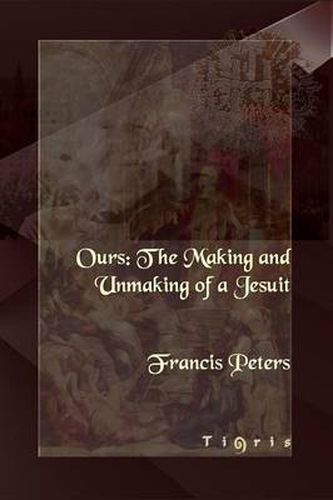Readings Newsletter
Become a Readings Member to make your shopping experience even easier.
Sign in or sign up for free!
You’re not far away from qualifying for FREE standard shipping within Australia
You’ve qualified for FREE standard shipping within Australia
The cart is loading…






This title is printed to order. This book may have been self-published. If so, we cannot guarantee the quality of the content. In the main most books will have gone through the editing process however some may not. We therefore suggest that you be aware of this before ordering this book. If in doubt check either the author or publisher’s details as we are unable to accept any returns unless they are faulty. Please contact us if you have any questions.
The Jesuits - that group of clerics so deeply imbedded in the dreams and nightmares of the Catholic Church and in the history of the world. Sometimes saints and sometimes energetic and devious schemers, the Jesuits have educated and trained most of the Catholic intellectuals of America and Europe for the last four hundred years. James Joyce was theirs, as was Californias Governor Edmund G. Brown, Jr.; former Massachusetts Congressman Robert F. Drinan still is. Known to some as towering intellectuals, to others as the greatest of master spies, they are known to themselves simply as Ours. F. E. Peters first encountered the Society of Jesus while attending Americas premier Jesuit prep school, where the intrigue and romance of the Popes marine corps became so intoxicating that, upon graduation, he enlisted and for nine years lived ‘The Life’. What is this extraordinary system of belief and training? Peters throws open the doors of the Jesuit citadel - the novitiate - and looks back at Ours with their own ironic, entertaining eye, and shows us the making of a Jesuit: self-discipline perfected by long days filled with silence broken only by conversations in Latin; a keen intellect honed by an education as rigorous in the classics and philosophy as in any nineteenth-century university. But this is also a story of a young mans coming of age in a unique culture - 150 young men held incommunicado from the outside world for the first four years of their fifteen-year training on a landscape fraught with ironies of eighteen-, nineteen-, and twenty-year-old mortals trying to live the lives of saints. This is a personal story told without romance and without rancor, and if the Jesuit life is one of bondage to an almost impossible ideal of perfect obedience and self-denial, it is also, as Ours makes clear without the slightest trace of jesuitical equivocation, a life of intelligence, of intense camaraderie, and of high good humour.
$9.00 standard shipping within Australia
FREE standard shipping within Australia for orders over $100.00
Express & International shipping calculated at checkout
This title is printed to order. This book may have been self-published. If so, we cannot guarantee the quality of the content. In the main most books will have gone through the editing process however some may not. We therefore suggest that you be aware of this before ordering this book. If in doubt check either the author or publisher’s details as we are unable to accept any returns unless they are faulty. Please contact us if you have any questions.
The Jesuits - that group of clerics so deeply imbedded in the dreams and nightmares of the Catholic Church and in the history of the world. Sometimes saints and sometimes energetic and devious schemers, the Jesuits have educated and trained most of the Catholic intellectuals of America and Europe for the last four hundred years. James Joyce was theirs, as was Californias Governor Edmund G. Brown, Jr.; former Massachusetts Congressman Robert F. Drinan still is. Known to some as towering intellectuals, to others as the greatest of master spies, they are known to themselves simply as Ours. F. E. Peters first encountered the Society of Jesus while attending Americas premier Jesuit prep school, where the intrigue and romance of the Popes marine corps became so intoxicating that, upon graduation, he enlisted and for nine years lived ‘The Life’. What is this extraordinary system of belief and training? Peters throws open the doors of the Jesuit citadel - the novitiate - and looks back at Ours with their own ironic, entertaining eye, and shows us the making of a Jesuit: self-discipline perfected by long days filled with silence broken only by conversations in Latin; a keen intellect honed by an education as rigorous in the classics and philosophy as in any nineteenth-century university. But this is also a story of a young mans coming of age in a unique culture - 150 young men held incommunicado from the outside world for the first four years of their fifteen-year training on a landscape fraught with ironies of eighteen-, nineteen-, and twenty-year-old mortals trying to live the lives of saints. This is a personal story told without romance and without rancor, and if the Jesuit life is one of bondage to an almost impossible ideal of perfect obedience and self-denial, it is also, as Ours makes clear without the slightest trace of jesuitical equivocation, a life of intelligence, of intense camaraderie, and of high good humour.